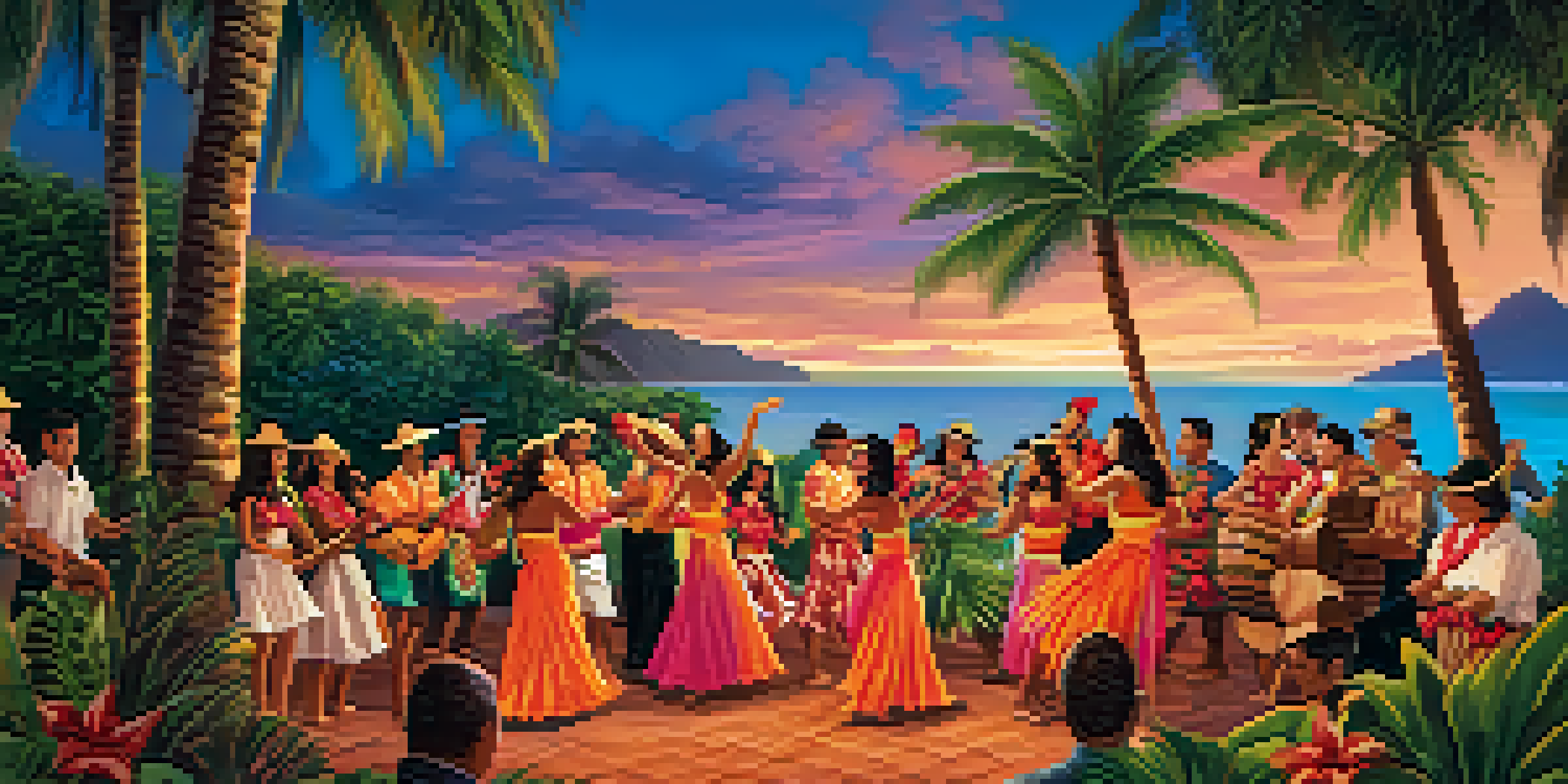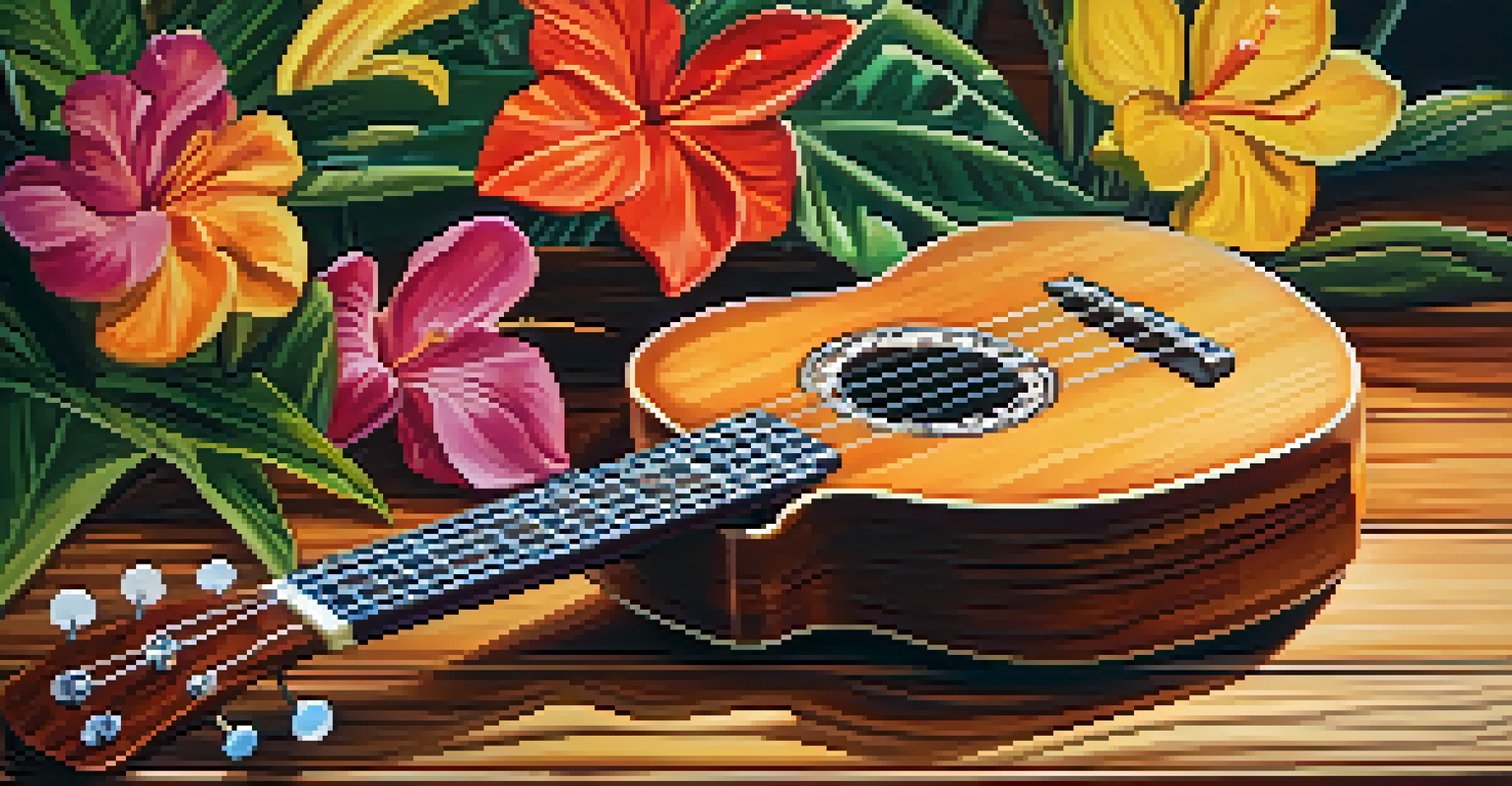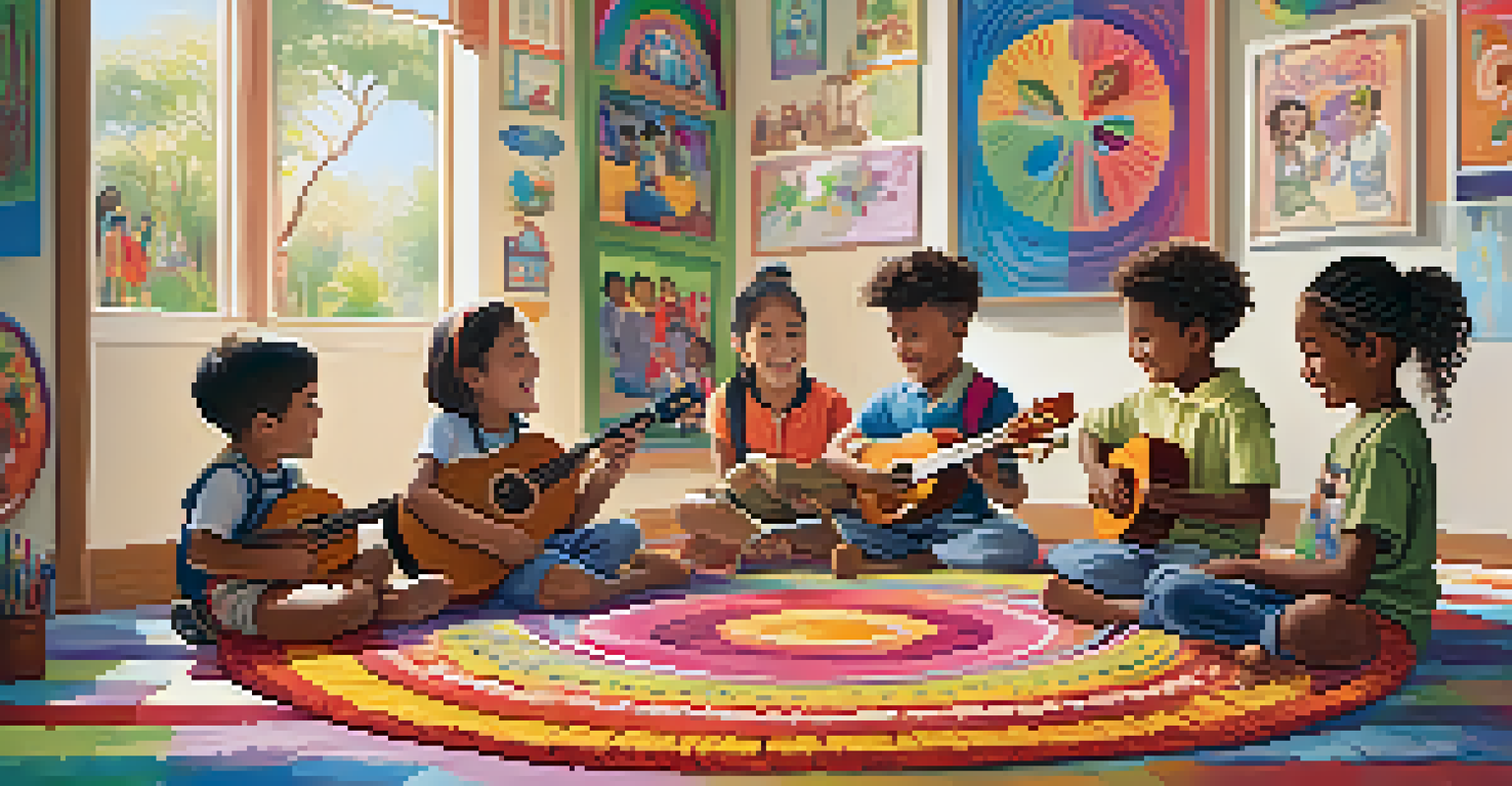The Role of Ukulele in Pacific Island Folk Traditions

The Ukulele: A Symbol of Pacific Island Culture
The ukulele, often associated with Hawaiian music, serves as a profound symbol of the broader Pacific Island cultures. Its cheerful sound and lively strumming patterns evoke the spirit of island life, where music is woven into the fabric of daily activities. From celebrations to casual gatherings, the ukulele acts as a bridge, connecting people through shared melodies and memories.
Music can change the world because it can change people.
Historically, the ukulele was introduced to Hawaii by Portuguese immigrants in the 19th century, evolving into a beloved instrument among locals. Over time, it has become synonymous with Hawaiian music but also holds a significant place in the folk traditions of other Pacific Islands. This musical evolution showcases the adaptability of the ukulele as it blends seamlessly into diverse cultural contexts.
Today, the ukulele is not just an instrument; it represents a cultural identity and pride for many Pacific Islanders. It embodies the resilience of their traditions, as communities continue to embrace and innovate with it in their music. The ukulele’s role in festivals and cultural events highlights its importance in preserving and celebrating these vibrant heritages.
The Ukulele's Influence on Traditional Storytelling
In Pacific Island cultures, storytelling is a cherished tradition, often accompanied by music to enhance the narrative. The ukulele plays a vital role in this art form, providing a melodic backdrop that brings stories to life. Whether recounting tales of ancestors or myths of creation, the ukulele's gentle strumming adds an emotional depth that resonates with listeners.

For example, in Hawaii, tales of the demigod Maui are often sung with ukulele accompaniment, making the stories more engaging and memorable. This practice not only helps preserve oral histories but also fosters a sense of community as people gather to share these experiences. The ukulele becomes a tool for connection, bridging generations through shared cultural narratives.
Cultural Symbol of the Pacific
The ukulele represents a blend of cultural identity and pride for Pacific Islanders, connecting communities through music.
Moreover, the simplicity of the ukulele makes it accessible to both young and old, encouraging participation in storytelling sessions. Children are often taught to play simple tunes, allowing them to contribute to the tradition and keep it alive. This intergenerational exchange ensures that the stories and the music continue to thrive within the community.
Celebrations and Festivals: The Ukulele Takes Center Stage
Festivals in Pacific Island cultures are vibrant celebrations of life, and the ukulele often takes center stage during these events. From luaus to hula competitions, its lively sound invites everyone to join in the festivities. The instrument's upbeat nature creates an atmosphere of joy and togetherness, making it a staple at any gathering.
The ukulele is a joyful instrument, and its sound is a reflection of the spirit of the islands.
One of the most notable events is the Merrie Monarch Festival in Hawaii, where the ukulele plays a pivotal role in the hula performances. Musicians skillfully accompany dancers, enriching the visual experience with harmonious melodies. This synergy between the ukulele and hula exemplifies how music and dance are intertwined in Pacific Island traditions.
Furthermore, these celebrations often feature competitions where musicians showcase their talents, fostering community pride and cultural exchange. The ukulele's presence in such events highlights its importance not only as an instrument but also as a cultural ambassador. Through these performances, the ukulele helps to keep traditions alive while inviting new audiences to appreciate Pacific Island culture.
The Evolution of Ukulele Music Across the Pacific
As the ukulele traveled beyond Hawaii, it embraced diverse musical styles, evolving into various forms across the Pacific Islands. Artists began incorporating local rhythms and instruments, creating a rich tapestry of music that reflects their unique identities. This evolution showcases the versatility of the ukulele, allowing it to adapt to different cultural influences while maintaining its essence.
For instance, in Fiji, the ukulele often accompanies traditional meke dances, blending contemporary sounds with age-old customs. In this way, the instrument contributes to the ongoing dialogue between tradition and modernity, allowing communities to express their heritage while appealing to younger generations. The fusion of styles keeps the music fresh and relevant.
Enhancing Storytelling Traditions
Accompanying traditional narratives, the ukulele enriches storytelling by adding emotional depth and fostering community bonds.
Additionally, the rise of global interest in the ukulele has prompted island musicians to explore new genres, from reggae to pop. This cross-pollination of musical influences broadens the ukulele's appeal and encourages collaborative projects between artists from different backgrounds. Such creativity not only enriches the music scene but also fosters a sense of unity among Pacific Islanders.
Teaching and Learning: Ukulele in Education
The ukulele has found its way into educational settings across the Pacific, making music education more accessible and enjoyable. Many schools incorporate the instrument into their curricula, recognizing its simplicity and engaging nature. Students are often introduced to music theory and rhythm through the ukulele, laying a solid foundation for their musical journey.
In after-school programs and community centers, ukulele classes foster creativity and teamwork among children. Learning to play in groups not only builds musical skills but also encourages social interaction and collaboration. These experiences are invaluable, as they help instill confidence and a sense of belonging in young learners.
Moreover, the rise of online tutorials has made it easier for individuals of all ages to learn the ukulele from the comfort of their homes. This accessibility has led to a resurgence in its popularity, with families gathering to play together. The ukulele’s role in education transcends mere musical instruction; it cultivates a love for music that can last a lifetime.
The Ukulele as a Tool for Cultural Preservation
In an age of rapid globalization, the ukulele has emerged as a vital tool for cultural preservation among Pacific Island communities. As traditional practices face the threat of fading away, musicians are using the ukulele to capture and share their rich heritage. This instrument not only helps keep cultural traditions alive but also fosters a sense of pride in one's roots.
By creating new compositions that reflect their experiences and stories, artists are ensuring that their cultural narratives are passed down to future generations. The ukulele serves as a vessel for these expressions, allowing individuals to connect with their history while also adapting to contemporary influences. This dynamic interplay is crucial for the survival of cultural identities.
Promoting Cultural Preservation
As a tool for cultural preservation, the ukulele helps capture and share heritage, ensuring that traditions thrive amid globalization.
Additionally, community initiatives often promote the ukulele as a way to engage younger generations in their heritage. Workshops and cultural festivals centered around the ukulele create an inviting space for learning and sharing. Through these efforts, the ukulele becomes more than just an instrument; it transforms into a symbol of resilience and continuity in Pacific Island cultures.
Conclusion: The Enduring Legacy of the Ukulele
The ukulele's role in Pacific Island folk traditions is a testament to its enduring legacy and cultural significance. It has transcended its origins to become a beloved instrument that unites communities and celebrates shared histories. As it continues to evolve, the ukulele remains a vital part of the cultural landscape across the Pacific Islands.
Through storytelling, celebrations, education, and cultural preservation, the ukulele fosters connections among individuals and generations. It invites participation and creativity, ensuring that the music and traditions of the Pacific Islands thrive in a rapidly changing world. The sound of the ukulele is not just music; it is the heartbeat of a culture.

In essence, the ukulele embodies the spirit of the Pacific Islands, reflecting their uniqueness while embracing innovation. As more people discover this charming instrument, its influence will undoubtedly continue to grow, enriching lives and preserving cultural legacies for years to come.